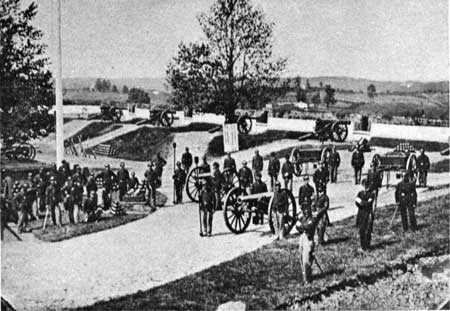|
FORD'S THEATRE National Historic Site |
 |
Lincoln's Life as Depicted in the Museum
Exhibits (continued)

Fort Stevens, D. C., August 1865.
(Reproduced from photograph by Mathew B. Brady, Washington, D.
C.)
THE WAR 1861—65. As the leader of the North in the Civil War, Lincoln was beset from the beginning by the clamors of an impatient Congress, press, and people for a quick conclusion of hostilities. In their repeated cry "On to Richmond," during the spring of 1861, the people of the North did not consider or understand the long preparation, the seemingly endless training of raw recruits, the hard fighting, the bitter disappointments that must be endured before victory could rest with the North, Though the public gradually came to realize that the war was not an easy game to be quickly ended, political pressure for action unjustified on military grounds was always a problem confronting Lincoln. Military men regarded with irritation these popular demands for precipitate action, and Lincoln himself at first partly shared the popular point of view. He realized, moreover, as generals often did not, that there were occasions on which political expediency might be as important as military considerations. He therefore emphasized the defense of Washington, sometimes to the detriment of strategic plans, as during McClellan's Peninsular Campaign. Yet, like the public, Lincoln was eager for quick results and sanctioned the premature movement into Virginia in the summer of 1861 that was to culminate in a panicky rout after the First Battle of Manassas.
Unable always to accept the designs of his generals and harassed by the inability of some technically competent officers like McClellan to adopt a sufficiently energetic plan of campaign, Lincoln at times interfered with strategy. Since he was not trained in military matters, his interference was occasionally unfortunate in its results. He was also sometimes influenced excessively by the easy victories of mediocre generals over inferior opposition and placed such officers in posts to which their capacities proved unequal. At the end, however, Lincoln had the wisdom to recognize his own deficiencies in military matters and the prime necessity for the guidance of military affairs by military men. Throughout the summer and fall of 1864 he therefore supported Grant in the face of widespread denunciation of that general.
In spite of his limitations in military affairs, Lincoln was an outstanding war President. Defeat in the field, however bitter, never shook his determination to win the war or his confidence in ultimate victory. Although the great loss of life bore heavily upon him, he never shared the hysterical willingness of Horace Greeley to stop "these rivers of human blood" when Grant's Virginia campaign seemed stalled with heavy casualties in the summer of 1864. He had set for himself an undeviating road to victory and that goal he pursued to Appomattox in spite of discouragements that would have given pause to a man of lesser stature.
On July 11—12, 1864, the city of Washington was threatened by Confederate forces under Jubal A. Early. The defenses of the Capital were stripped of experienced soldiers, as all available aid had been sent to General Grant in a determined effort to capture Richmond. Early's attack was directed against Fort Stevens, north of the city. Only the arrival of veteran reinforcements from the Richmond front saved Washington from capture. The engagement, on July 12, was witnessed by President Lincoln, who stood exposed on the parapet until a surgeon at his side was wounded by a Minie ball. Only when ordered to do so by Maj. Gen. Horatio Wright did the President take a position behind the parapet.

|
|
Last Modified: Mon, Dec 2 2002 10:00:00 am PDT |


